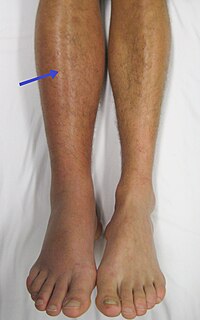
Hematological cancer survivors’ experiences of participating in a shared care follow-up—an exploratory interview study
Sign Up to like & getrecommendations! Published in 2021 at "Journal of Cancer Survivorship"
DOI: 10.1007/s11764-020-00955-y
Abstract: Purpose The aim of the present study was to explore hematological cancer survivors’ experiences of participating in a shared care follow-up based on alternating routine physician visits and nurse-led telephone consultations at the Department of… read more here.
Keywords: shared care; cancer survivors; hematological cancer; cancer ... See more keywords

Epidemiology of venous thromboembolism in hematological cancers: The Scandinavian Thrombosis and Cancer (STAC) cohort.
Sign Up to like & getrecommendations! Published in 2017 at "Thrombosis research"
DOI: 10.1016/j.thromres.2017.09.002
Abstract: INTRODUCTION Venous thromboembolism (VTE) is an important cause of morbidity and mortality in cancer patients, however the risk of VTE differs according to cancer type. Hematological cancers have varying phenotypes. Incidence rates (IR) of VTE… read more here.
Keywords: vte; venous thromboembolism; epidemiology; hematological cancer ... See more keywords

Study of the Chromosomal Abnormalities and Associated Complex Karyotypes in Hematological Cancer in the Population of West Bengal: A Prospective Observational Study
Sign Up to like & getrecommendations! Published in 2021 at "Indian Journal of Medical and Paediatric Oncology"
DOI: 10.1055/s-0041-1733827
Abstract: Introduction Chromosomal instability is an important feature of hematological cancer. The pathogenesis is complex and it involves genetic and epigenetic factors. As a genetic factor, chromosomal instability may play a key role in leukemogenesis. Accumulation… read more here.
Keywords: complex karyotypes; study; chromosomal instability; hematological cancer ... See more keywords

#24: Neutropenic Enterocolitis in the Pediatric Patient with Hematological Cancer at Centro Medico Nacional 20 de Noviembre, from June 2019 to May 2020
Sign Up to like & getrecommendations! Published in 2021 at "Journal of the Pediatric Infectious Diseases Society"
DOI: 10.1093/jpids/piab031.041
Abstract: Neutropenic Enterocolitis is a life-threatening condition which occurs in patients presenting neutropenia (absolute neutrophil count read more here.
Keywords: diagnosis; treatment; neutropenic enterocolitis; hematological cancer ... See more keywords

The association between methionine synthase A2756G polymorphism and hematological cancer
Sign Up to like & getrecommendations! Published in 2017 at "Medicine"
DOI: 10.1097/md.0000000000007469
Abstract: Background: Numerous studies have focused on the association of methionine synthase (MS) A2756G polymorphism and acute hematological cancer risk. However, the results remain inconsistent. Therefore, a meta-analysis was performed to derive a more precise estimate… read more here.
Keywords: cancer; association methionine; a2756g polymorphism; hematological cancer ... See more keywords

The Interaction Between Hematological Cancer Patients and Family Caregivers and Their Life Changes
Sign Up to like & getrecommendations! Published in 2020 at "Cancer Nursing"
DOI: 10.1097/ncc.0000000000000800
Abstract: Background Diagnosis of hematological cancer affects patients and caregivers as a unit. Few studies have focused on the relationship between hematological cancer patients and their caregivers. Objective To explore (a) the interaction between patients receiving… read more here.
Keywords: hematology; family caregivers; cancer; oncology ... See more keywords

Extracellular galectins as controllers of cytokines in hematological cancer.
Sign Up to like & getrecommendations! Published in 2018 at "Blood"
DOI: 10.1182/blood-2018-04-846014
Abstract: Galectins and cytokines are both secreted proteins whose levels are prognosis factors for several cancers. Extracellular galectins bind to the glycans decorating glycoproteins and are overproduced in most cancers. Accumulative evidence shows that galectins regulate… read more here.
Keywords: controllers cytokines; cytokines hematological; galectins controllers; hematological cancer ... See more keywords

Hematological Cancer Consortium: Multi-Center Acute Myeloid Leukemia Registry Data from India
Sign Up to like & getrecommendations! Published in 2018 at "Blood"
DOI: 10.1182/blood-2018-99-116853
Abstract: Multicenter large collaborative research groups have been the cornerstone for advances that have been made in multiple disciplines in medicine. These collaborative groups are specifically useful in situation where no single center based dataset is… read more here.
Keywords: acute; center; cancer consortium; hematological cancer ... See more keywords

Targeting metabolism: A potential strategy for hematological cancer therapy
Sign Up to like & getrecommendations! Published in 2022 at "World Journal of Clinical Cases"
DOI: 10.12998/wjcc.v10.i10.2990
Abstract: Most hematological cancer-related relapses and deaths are caused by metastasis; thus, the importance of this process as a target of therapy should be considered. Hematological cancer is a type of cancer in which metabolism plays… read more here.
Keywords: targeting metabolism; metabolism potential; therapy; hematological cancer ... See more keywords

Couples Coping With Hematological Cancer: Support Within and Outside the Couple – Findings From a Qualitative Analysis of Dyadic Interviews
Sign Up to like & getrecommendations! Published in 2022 at "Frontiers in Psychology"
DOI: 10.3389/fpsyg.2022.855638
Abstract: Objective Cancer affects the patients as well as their partners. Couples use different strategies to cope with cancer and the associated burden: individual coping, dyadic coping, and support from the social network and from professional… read more here.
Keywords: dyadic interviews; outside couple; support; hematological cancer ... See more keywords